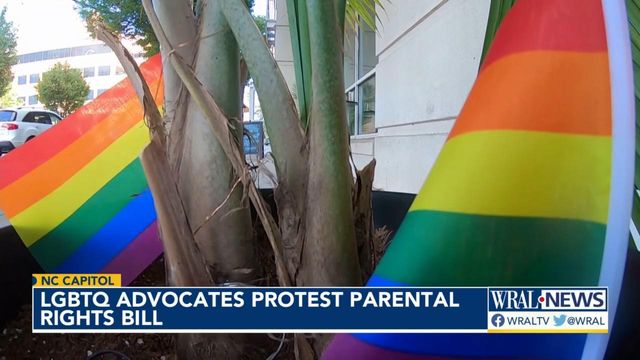Critics of NC LGBTQ student bill raise concerns about privacy, suicide rates
Teachers, parents and student advocates lined up Thursday to speak out against a section of the proposed Parents' Bill of Rights legislation before the Senate health care committee.
Posted — UpdatedTaylor Cordes, a North Carolina educator, told the committee that teachers shouldn’t be required to tell parents when students come to them with concerns such as sexual orientation or gender identity. She said school may be their only supportive environment.
“Unfortunately, there are many households where children are not safe coming out. Forcibly making children come out in environments that are hostile will absolutely put their lives at risk,” Cordes said
Gretchen Phillips, a former educator, said the legislation would create a climate "where teachers feel like they are not allowed to refer students to affirming services because their parents do not approve."
"This is going to make it so that teachers feel pressure not to meet their students where their needs are, but to go by their parents' comfort level, even when their parents' comfort level is directly against the best interests of the mental health care of their children," Phillips told the committee.
Republican Sen. Ralph Hise, a supporter of the bill, disagreed. He said parents, not teachers or counselors, know their children best and should have final say in whether their children need counseling or support.
“Having a school professional [with] limited knowledge … make those decisions and not inform parents should be criminal as a matter of fact,” Hise, R-Mitchell, said.
It would also ban health care providers from providing any health care, even mental health services, to minors without parental consent, except in an emergency. Violators could be fined $5,000.
The health care committee at times tried to stifle some criticism of the bill Thursday, asking speakers to only comment on certain health care provisions.
When child advocate Sarah Montgomery mentioned high suicide rates among LGBTQ kids, Sen. Joyce Krawiec, the committee’s chairwoman, shut off the microphone — a move rarely seen in legislative committee meetings.
“Miss Montgomery, can you please stick to section three,” Krawiec said, interrupting Montgomery, who was representing advocacy coalition Every Child NC. "That is not appropriate in this committee."
"I will ask the sergeant at arms to remove anyone else who gets out of line that way," Krawiec warned.
According to a national survey by the Trevor Project, an LGBTQ student advocacy group and crisis hotline, 45% of LGBTQ youth seriously considered suicide in 2021, and 14% attempted suicide. The survey also found that 60% of LGBTQ youth wanted mental health care but didn’t get it in the past year. Among that group, 48% said they didn't get care because they feared discussing mental health concerns, while 45% cited concerns with obtaining parent or caregiver permission.
After the meeting, WRAL News asked Krawiec why comments were limited to a narrow portion of the bill.
“That’s the only part this committee was dealing with,” Krawiec said. “We hadn’t even looked at other parts of the bill.”
Sen. Jay Chaudhuri, D-Wake, criticized the bill during a hearing before the Senate education committee, saying it "can certainly be interpreted as sending a signal from North Carolina that our state is not welcoming."
Conservative groups have said parents have a right to be more involved in students' lives than schools seem willing to permit, and that the proposed legislation empowers parents to set what they consider to be more age-appropriate guidelines for their children.
“The last thing our state needs is another Republican political ploy like the bathroom bill which hurt our people and cost us jobs," he said in a statement. "So let’s keep the 'Don’t Say Gay' culture wars out of North Carolina classrooms.”
Kendra R. Johnson, executive director of LGBTQ advocacy group Equality NC, called the legislation an attack on students, educators and parents.
“Forced outing and erasure in the curriculum have severe impacts on queer and trans young people’s safety, mental health and well being, especially poor youth and youth of color,” she said in a statement, adding that many LGBTQ children report living in unsafe housing. “... This bill will place more children directly in harm’s way.”
Related Topics
• Credits
Copyright 2024 by Capitol Broadcasting Company. All rights reserved. This material may not be published, broadcast, rewritten or redistributed.






